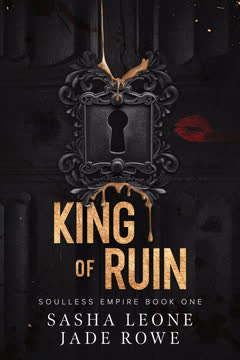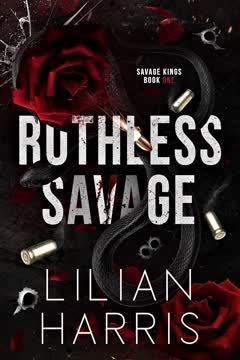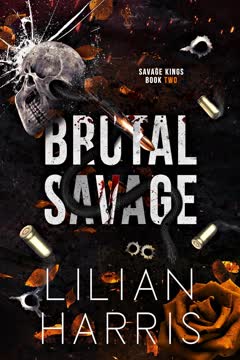Plot Summary
Reluctant Night Out
Natalya, a hardworking and struggling architecture student, is convinced by her friends to go out for a rare night of fun at an exclusive Chicago club. She's anxious, underdressed, and burdened by financial worries, but gives in to their insistence, hoping for a brief escape from her daily grind. The club's opulence and the city's glittering skyline only highlight her sense of not belonging, but she tries to let go and enjoy herself, unaware that this night will change her life forever.
Shadows in the Club
Inside the club, Natalya is both overwhelmed and invisible, feeling out of place among the wealthy and glamorous. She's accosted by a predatory man, Mike Spolanski, but is saved by the intervention of Andrei, the club's enigmatic owner and a powerful Bratva boss. Their encounter is electric and unsettling—Andrei's interest in her is immediate and intense, and Natalya is both drawn to and wary of his dangerous aura. This moment marks the beginning of a fateful connection.
The King's Gaze
From his vantage point, Andrei surveys his empire with boredom and disdain, until Natalya catches his eye. Her innocence and discomfort intrigue him—she's unlike the women who usually orbit his world. Andrei is a man who has everything but feels nothing, and Natalya's presence awakens a hunger in him. He orchestrates their meeting, setting in motion a game of dominance, protection, and seduction.
Collision of Fates
When Mike Spolanski assaults Natalya, Andrei intervenes with brutal efficiency, making it clear he is both her savior and a man to be feared. He draws her into his private world, offering her safety and luxury in exchange for obedience and trust. Natalya is torn between gratitude, fear, and a growing attraction to the man who now holds her fate in his hands.
The Devil's Bargain
Alone in Andrei's office, Natalya is seduced by his commanding presence. Their chemistry explodes into a night of passion that is both her awakening and her undoing. Andrei's need for control and Natalya's longing for escape collide, binding them together in a relationship that is as much about power as it is about pleasure. For Natalya, this is her first taste of true desire—and true danger.
Chains and Choices
The morning after, Natalya is wracked with confusion and shame. She flees Andrei's office, only to find her world unraveling—her apartment is burned down by a monstrous figure named Nikolai, and she is left homeless and alone. Andrei, obsessed and possessive, begins to hunt for her, determined not to let her slip away. Natalya is forced to choose between the devil she knows and the unknown dangers stalking her from the shadows.
The Monster's Message
As Natalya struggles to survive, she is haunted by the memory of Nikolai, who claims to "own" her and leaves her a chilling message. Andrei's world is also under attack—his criminal empire is being targeted by a mysterious enemy, and he must balance his obsession with Natalya against the need to protect his throne. Both are caught in a web of violence, secrets, and betrayal.
Shelter and Survival
Homeless and desperate, Natalya takes refuge in a shelter, clinging to the hope of rebuilding her life. She is forced to rely on her wits and the kindness of strangers, but the city's dangers are never far behind. Andrei, meanwhile, uses his power to track her down, offering her a devil's bargain: safety and comfort in exchange for her submission. With nowhere else to turn, Natalya accepts, stepping into a gilded cage.
The Predator's Game
In Andrei's mansion, Natalya is both pampered and watched. She is given every luxury, but her freedom is strictly controlled. Valentin, Andrei's blood brother and enforcer, becomes her reluctant guardian. As Natalya tries to find a way out, she discovers that Andrei's world is full of secrets, locked doors, and hidden dangers. Her attempts to contact the outside world only draw her deeper into the Bratva's web.
The Bratva's Queen
As Andrei's obsession deepens, he begins to see Natalya as more than a plaything—she is the queen he never knew he needed. Their relationship becomes a battle of wills, with Natalya fighting for autonomy and Andrei demanding loyalty. When a new wave of violence threatens his empire, Andrei must choose between power and love. Natalya, too, must decide if she can trust the man who owns her body—and perhaps her heart.
The Enemy Revealed
The attacks on Andrei's empire escalate, and the true enemy is revealed: Vadim, the former Pakhan, long thought dead—and Natalya's father. Vadim has orchestrated the chaos, using Nikolai as his weapon and Natalya as his pawn. The revelation shatters Natalya, who realizes she has been a bargaining chip in a war for power all along. Andrei, betrayed and enraged, prepares for a final confrontation.
The Father's Return
Vadim kidnaps Natalya, intending to use her to reclaim his throne. She is handed over to Nikolai, who plans to break her and use her as leverage against Andrei. Natalya's sense of self is pushed to the brink as she faces the monstrous men who see her as nothing but a tool. Her only hope is that Andrei will come for her—but she no longer knows if she wants to be saved.
The Trap is Set
Andrei, Valentin, and their allies race to rescue Natalya, but Vadim and Nikolai have set a trap. The final confrontation is brutal and bloody—Andrei faces Nikolai in a fight to the death, while Vadim tries to finish what he started years ago. Natalya, caught in the crossfire, must find the strength to fight for her own survival.
Blood and Betrayal
In a desperate act, Natalya turns the tables on her captors, using her wits and courage to escape. Andrei, gravely wounded, defeats his enemies with Natalya's help. Vadim is finally killed, and Nikolai meets a violent end. The cost is high—Andrei is left broken and near death, and Natalya is forever changed by the violence she has endured.
The Price of Power
As Andrei recovers, he must rebuild his shattered empire and reckon with the choices that brought him to the brink. Valentin is promoted, and the Bratva is restructured. Andrei and Natalya confront the scars—physical and emotional—left by their ordeal. Their love, tested by fire, emerges stronger but not unscathed.
The Rescue and Ruin
With the threat of Vadim and Nikolai gone, Andrei and Natalya are finally free to choose each other. Andrei proposes, offering Natalya not just his love but a partnership in rebuilding the city. Natalya, now empowered and no longer a pawn, accepts, determined to use her new position to help others like herself.
The Aftermath of War
A year later, Natalya is thriving—studying architecture, leading a massive redevelopment project, and expecting a child. Andrei, now a more human king, supports her dreams. Their world is not without challenges, but together they have forged a new empire—one built on love, loyalty, and hard-won freedom.
Love's True Name
In the end, Natalya and Andrei find peace not in power or possession, but in each other. Their journey from darkness to light is a testament to the power of choice, the cost of survival, and the redemptive force of love. The past is never truly gone, but together, they have built a future worth fighting for.
Characters
Natalya Datsyuk (Dimitrov)
Natalya is a young woman shaped by hardship—an orphan, a striver, and a survivor. Her intelligence and ambition are matched by deep insecurity and a longing for belonging. She is fiercely independent, yet vulnerable to the allure of protection and power. Her journey is one of self-discovery: from pawn to queen, from victim to architect of her own fate. Her relationship with Andrei is both a source of liberation and a new kind of captivity, forcing her to confront her deepest fears and desires. Her greatest strength is her refusal to be defined by anyone else's rules.
Andrei Zherdev
Andrei is the ruthless Pakhan of the Chicago Bratva—a man who has clawed his way to the top through violence, cunning, and sheer will. He is both protector and predator, capable of great tenderness and terrifying cruelty. Haunted by boredom and isolation, he is drawn to Natalya's innocence and spirit, seeing in her a chance for redemption and meaning. His love is possessive, obsessive, and transformative. Over the course of the story, Andrei is forced to choose between power and vulnerability, ultimately finding strength in surrendering to love.
Valentin Constanov
Valentin is Andrei's second-in-command and closest friend—a man of violence with a surprising sense of humor and loyalty. He is the steady hand behind Andrei's throne, willing to kill or die for his Pakhan. Valentin's own journey is one of self-realization, as he is promoted to a position of greater responsibility and begins to imagine a life beyond violence, especially as he develops feelings for Yelena.
Nikolai Fist
Nikolai is the story's most terrifying antagonist—a legendary assassin whose brutality is matched only by his cunning. Hired by Vadim, he becomes the instrument of chaos, burning Natalya's apartment and nearly destroying Andrei's empire. He is a force of nature, representing the darkest aspects of the criminal world and the ever-present threat of dehumanization.
Vadim Dimitrov (Comrade Vadim)
Vadim is the former Pakhan, long thought dead, and Natalya's estranged father. His return is the catalyst for the story's final act of violence and betrayal. Vadim is a master manipulator, using his daughter as a pawn in his quest for revenge and power. His inability to love or protect Natalya is his ultimate downfall, and his death marks the end of an era.
Yelena Laskin
Yelena is Natalya's best friend and a symbol of the life she might have had. Glamorous, ambitious, and fiercely loyal, Yelena provides comic relief and emotional support. Her own subplot with Valentin hints at the possibility of love and redemption even for those caught in the Bratva's orbit.
Ilya Rykov
Ilya is Andrei's tech expert—a brilliant, sarcastic, and slightly awkward newcomer to the Bratva. He is instrumental in uncovering the truth behind the attacks and tracking down the enemies threatening the empire. Ilya represents the new face of organized crime: analytical, detached, and indispensable.
Emily and Julia
Emily and Julia are Natalya's other friends, present at the fateful club night. They represent the world outside the Bratva—the ordinary lives and dreams that Natalya is forced to leave behind.
Saul
Saul is Natalya's catering boss, a small-time bully who fires her at her lowest point. He is a reminder of the everyday indignities and struggles that drive Natalya into Andrei's arms.
Mike Spolanski
Mike Spolanski is the entitled club-goer whose assault on Natalya sets the story in motion. His fate at Andrei's hands is a warning to all who underestimate the Bratva's power.
Plot Devices
Dual Narrative Structure
The story is told in alternating chapters from Natalya's and Andrei's points of view, allowing readers to experience both the vulnerability of the prey and the power of the predator. This structure deepens the psychological tension and highlights the shifting balance of power in their relationship.
The Locked Room / Gilded Cage
Natalya's journey is marked by a series of cages—her poverty, the club, Andrei's mansion, and finally her father's trap. Each setting is both a prison and a crucible, forcing her to confront her fears and desires. The motif of locked doors and forbidden rooms symbolizes the secrets and traumas that must be faced and overcome.
The Red Herring and Misdirection
The story uses misdirection to keep both characters and readers guessing about the true source of danger. The Italians, Nikolai, and Vadim are all suspects at various points, and the shifting alliances and betrayals create a sense of constant threat and uncertainty.
The Heirloom and the Vault
The recurring image of the vault, the crest, and the ring represent the inheritance of power, pain, and love. The vaults hold both literal and metaphorical secrets—Andrei's past, Vadim's survival, and the possibility of a new future. The ring, once locked away, becomes the symbol of a new beginning.
Foreshadowing and Repetition
The story is rich with foreshadowing—Natalya's early sense of dread, Andrei's warnings, the repeated motif of being watched or hunted. These echoes build suspense and reinforce the theme that the past is never truly gone, and that every choice has consequences.
Analysis
King of Ruin is a dark, modern fairy tale about power, trauma, and the search for belonging. At its core, it is a story of two broken people—one forged by violence, the other by neglect—who find in each other both a mirror and a means of escape. The novel explores the seductive allure of power and the dangers of surrendering autonomy for safety. Through its dual narrative, it interrogates the dynamics of dominance and submission, love and obsession, captivity and freedom. The story's central lesson is that true strength lies not in control, but in vulnerability and trust. By confronting their pasts and choosing each other, Natalya and Andrei break the cycle of violence and build a new legacy—one that is not defined by ruin, but by hope, healing, and the courage to love.
Last updated:
FAQ
Synopsis & Basic Details
What is King of Ruin about?
- A Dark Romance Saga: King of Ruin plunges readers into the dangerous world of the Chicago Bratva, following Natalya, a struggling architecture student, whose life takes a drastic turn after a fateful night at an exclusive club. She encounters Andrei Zherdev, the enigmatic and powerful Pakhan, who is immediately drawn to her innocence and defiance.
- Obsession and Survival: The story explores Andrei's escalating obsession with Natalya, pulling her from poverty into his opulent but controlled world. As Natalya navigates this gilded cage, she uncovers dark secrets about Andrei's empire and her own past, including a connection to the former Pakhan, Vadim, who resurfaces as a vengeful enemy.
- A Battle for Control: It's a tale of shifting power dynamics, where Natalya fights for her autonomy against both Andrei's possessiveness and the monstrous threats from her past, ultimately leading to a brutal confrontation that reshapes their lives and the future of the Bratva.
Why should I read King of Ruin?
- Intense Psychological Depth: King of Ruin offers a deep dive into the complex psychologies of its protagonists, Natalya and Andrei. Readers will be captivated by Natalya's journey from victim to empowered queen and Andrei's transformation from a bored, ruthless king to a man capable of genuine love and vulnerability, making their emotional arcs compelling.
- High-Stakes World-Building: The novel immerses you in a meticulously crafted criminal underworld, rich with Bratva traditions, power struggles, and high-octane action. The intricate plot, filled with betrayals and unexpected alliances, keeps the tension high and the pages turning, offering more than just a romance.
- Exploration of Morally Grey Themes: Beyond the romance, the book delves into themes of control, freedom, trauma, and redemption. It challenges readers to question the nature of love and power, presenting a relationship that is both dangerous and deeply transformative, appealing to fans of dark romance and suspense.
What is the background of King of Ruin?
- Modern Bratva Underworld: The story is set within the contemporary Chicago Bratva, a Russian mafia organization, detailing its hierarchical structure, brutal traditions, and the constant struggle for power. Concepts like "Pakhan" (the boss) and "blood brothers" are central to understanding the characters' loyalties and motivations.
- Urban Chicago Setting: The narrative leverages the contrasting landscapes of Chicago—from Natalya's dingy alleyways and homeless shelters to Andrei's glittering downtown penthouse and sprawling suburban mansion. This geographical contrast highlights Natalya's journey from destitution to extreme wealth, emphasizing the "gilded cage" theme.
- Trauma and Legacy: A significant background element is the lingering impact of past trauma on both protagonists. Andrei's rise to power involved overthrowing a tyrannical predecessor, Comrade Vadim, whose brutal legacy and unexpected survival drive much of the conflict, intertwining personal histories with the broader criminal landscape.
What are the most memorable quotes in King of Ruin?
- "I'm the devil, baby. Welcome to hell. I think you're going to like it here. In fact, I'll make sure you do…": This quote, spoken by Andrei to Natalya, perfectly encapsulates his dominant, possessive nature and the dark allure he represents. It foreshadows the seductive yet dangerous world he pulls her into, highlighting the themes of control and surrender in King of Ruin.
- "You are mine. I'm sorry you didn't realize it before. There is no one else, Natalya. I want you. But you were right, when a man like me wants something, he gets it. And he keeps it. You are not free to leave.": This powerful declaration from Andrei after the Spolanski incident solidifies his possessive claim over Natalya. It starkly defines their relationship's power dynamic, emphasizing her perceived lack of freedom and his unwavering determination, a core element of Andrei Zherdev's motivations.
- "I love you. Now fucking run! Please!": Andrei's desperate plea to Natalya during the final confrontation reveals the depth of his love and vulnerability, contrasting sharply with his usual stoicism. This quote is a pivotal emotional turning point, showcasing his willingness to sacrifice for her safety and cementing the true meaning of their bond in King of Ruin's ending explained.
What writing style, narrative choices, and literary techniques does Sasha Leone use?
- Dual Narrative Structure: Sasha Leone employs a dual point-of-view, alternating between Natalya and Andrei's perspectives. This narrative choice allows readers to intimately understand the internal conflicts, desires, and motivations of both protagonists, deepening the psychological complexity and emotional resonance of their evolving relationship.
- Sensory and Visceral Language: The prose is rich with vivid sensory details, particularly in descriptions of physical sensations, violence, and luxury. This visceral language immerses the reader in the intense experiences of the characters, from Natalya's fear and arousal to Andrei's controlled rage and possessive desire, enhancing the dark romance elements.
- Symbolism and Motif Repetition: Leone subtly weaves recurring symbols and motifs throughout the narrative, such as the "gilded cage," the viper and skull crest, and the motif of "fire" and "ashes." These elements add layers of meaning, foreshadow future events, and reinforce the central themes in King of Ruin, like confinement, power, and destruction leading to rebirth.
Hidden Details & Subtle Connections
What are some minor details that add significant meaning?
- Natalya's Phone Charging Habit: Early in the story, Natalya mentions charging her phone and laptop at work to save on home electricity. This seemingly minor detail subtly highlights her extreme financial hardship and resourcefulness, underscoring the depth of her poverty before Andrei's intervention and making her later acceptance of his "gilded cage" more understandable.
- The "Sassy Subconscious" Voice: Natalya's internal monologue often features a "sassy subconscious" that challenges her self-perception and rationalizations. This inner voice acts as a subtle form of foreshadowing, hinting at her hidden desires and the eventual breakdown of her self-imposed independence, revealing deeper Natalya Datsyuk motivations.
- Andrei's "Disappointment" at Natalya's Mercy: When Andrei holds Mike at knifepoint and Natalya pleads, "Don't kill him!", Andrei notes a "glint of disappointment" in his eyes. This subtle reaction reveals Andrei's inherent brutality and his desire for Natalya to embrace a darker, more ruthless side, foreshadowing his later attempts to "corrupt" her.
What are some subtle foreshadowing and callbacks?
- The Gas Mask and Mezzanine Silhouette: In Chapter 1, Natalya notices a "giant gas mask hanging from the ceiling" and a "broad silhouette standing deep within the shadows" on the mezzanine. This subtly foreshadows the club's owner, Andrei, and the "nuclear-bunker theme" of his world, hinting at the dangerous, post-apocalyptic feel of his empire and the hidden threats within it.
- Andrei's Boredom and Desire for a "Challenge": Early in Andrei's POV, he expresses profound boredom with his life and a craving for a "fucking challenge." This foreshadows his immediate and intense interest in Natalya, who he perceives as "not trying to fit in" and therefore a unique and stimulating challenge, setting the stage for his obsessive pursuit.
- The "Little Deer" and "Angel" Pet Names: Andrei consistently refers to Natalya as "little deer" and "angel." While seemingly affectionate, these names subtly foreshadow his perception of her as innocent prey to be hunted and possessed, and later, an angelic figure whose "wings" he intends to "burn off" to bring her into his "kingdom," highlighting the themes of dominance and transformation.
What are some unexpected character connections?
- Andrei and Natalya's Shared Orphan Background: A subtle but significant connection is revealed when Andrei mentions he was an orphan too, just like Natalya. This shared past, though experienced differently, creates an unexpected layer of empathy and understanding between them, suggesting a deeper bond beyond their initial power dynamic and contributing to Andrei Zherdev's motivations for protecting her.
- Valentin's Hidden Affection for Yelena: Valentin, Andrei's ruthless second-in-command, shows an unexpected flirtatious side with Yelena, Natalya's best friend. His playful banter and subtle actions, like taking her phone number, hint at a potential romantic subplot and a softer side to his character, contrasting with his usual brutal demeanor.
- The Viper and Skull Crest as a Family Heirloom: The recurring crest, initially a symbol of Andrei's Bratva power, is later revealed to be a family heirloom belonging to Natalya's mother and father (Vadim). This unexpected connection links Natalya directly to the very foundation of the Bratva and Andrei's past, making her inheritance of the ring and the empire a deeply symbolic act of reclaiming her true legacy.
Who are the most significant supporting characters?
- Ilya Rykov: The Indispensable Cyber Genius: Beyond his role as a problem-solver, Ilya represents the evolving face of organized crime, where technological prowess is as crucial as brute force. His analytical mind and ability to uncover hidden truths (like Vadim's survival and Natalya's true identity) make him Andrei's intellectual foil and an essential asset, driving key plot revelations.
- Valentin Constanov: The Loyal Conscience: While primarily Andrei's enforcer and blood brother, Valentin serves as a crucial sounding board and, at times, Andrei's moral compass. His unwavering loyalty is tested by Andrei's obsession with Natalya and the escalating war, but his willingness to challenge Andrei (e.g., about the Italian alliance) highlights his deep commitment and strategic thinking, making him more than just a brute.
- Yelena Laskin: The Unwitting Catalyst: Initially appearing as a superficial friend, Yelena's actions (inviting Natalya out, holding her phone) inadvertently set major plot points in motion. Her later connection with Valentin and her role in Natalya's life provide a grounding link to Natalya's past and a glimpse of normalcy, emphasizing the stark contrast of Natalya's new world.
Psychological, Emotional, & Relational Analysis
What are some unspoken motivations of the characters?
- Andrei's Quest for Meaning Beyond Power: While Andrei explicitly states his boredom and desire for a "challenge," his deeper, unspoken motivation is a profound loneliness and a yearning for genuine connection. His obsession with Natalya isn't just about dominance; it's a desperate attempt to fill the void left by his isolated life at the top, seeking a partner who can truly "see" him.
- Natalya's Subconscious Desire for Protection: Despite her fierce independence and initial resistance, Natalya's repeated returns to Andrei's orbit, even after experiencing his violence, hint at a subconscious longing for the ultimate protection she never had as an orphan. Her "slut" internal monologue after their first encounter reveals a hidden desire for release and care, even if it comes from a dangerous source.
- Vadim's Need for Validation: Beyond reclaiming his throne, Vadim's vengeful actions are driven by a deep-seated need for validation and recognition, particularly from his daughter. His willingness to sacrifice Natalya as "payment" and his obsession with proving his superiority over Andrei stem from a wounded ego and a desire to reassert his perceived genius, even if it means destroying his own family.
What psychological complexities do the characters exhibit?
- Natalya's Trauma-Induced Amnesia and Resilience: Natalya exhibits psychological complexities stemming from her childhood trauma, including a partial amnesia about her early life ("It's hard to remember much from before I was a teenager"). This coping mechanism highlights her resilience, but also makes her vulnerable to manipulation, as her past is literally a blank slate for others to fill, impacting her Natalya Datsyuk analysis.
- Andrei's Controlled Sadism and Protective Instincts: Andrei presents a complex duality: he is capable of extreme cruelty and enjoys wielding power, yet he also displays fierce protective instincts, especially towards Natalya. His desire to "burn those wings right off" Natalya while simultaneously wanting to "mend" his "broken angel" showcases a fascinating psychological tension between his inherent nature and his evolving emotional landscape.
- The Stockholm Syndrome-like Bond: Natalya's emotional journey often mirrors aspects of Stockholm Syndrome, where her fear and captivity gradually intertwine with genuine affection and loyalty towards Andrei. Her internal conflict between running and staying, and her eventual confession of love, highlight the psychological complexities of a bond forged under duress, making her choices highly debatable.
What are the major emotional turning points?
- **Natalya's First Orgasm with
Review Summary
King of Ruin has received mixed reviews, with an average rating of 3.65 out of 5. Positive reviews praise the suspenseful plot, steamy romance, and compelling characters. Negative reviews criticize poor writing, inconsistent character development, and unrealistic scenarios. Many readers found the relationship between Andrei and Natalya engaging, while others felt it lacked depth. The book's mafia setting and enemies-to-lovers trope were appealing to some, but others found the story cliché and poorly executed. Opinions on the spice level varied, with some enjoying it and others finding it cringeworthy.
Similar Books
Download PDF
Download EPUB
.epub digital book format is ideal for reading ebooks on phones, tablets, and e-readers.











